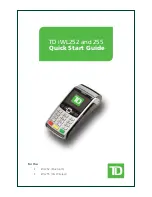
nugget
39
Reader Command Reference
7-23
7
Transmit File
There are three ways to transmit files from the TRAKKER Antares terminals:
•
Use the serial port to transmit files from the 246X terminal.
•
Use the serial port to convert and transmit 8-bit binary files to 7-bit ASCII files
from the 246X terminal.
•
Use network communications to transmit files from the 2461 terminal.
For help connecting the terminal to a host computer or the DCS 300, see Chapter 4,
“Operating the Terminal in a Network.”
Transmit File Through the Serial Port
Purpose:
Transmits a file from the 246X terminal through the serial port and saves it on the host
computer. You must have the terminal connected to the host through a serial port. For
help, see Chapter 2, “Installing the Terminal.”
On the host, you need to receive the file using a serial communications package (i.e.,
Windows 3.1 Terminal, Win95 Hyperterminal, Crosstalk, or Procomm) that supports
one of these protocols:
•
XMODEM
•
XMODEM-1K
•
YMODEM
XMODEM-1K
is a version of
XMODEM
that supports 1024-byte blocks as well as the
standard 128-byte
XMODEM
data blocks, which increases the throughput.
YMODEM
has the additional ability to transfer a file name with the file’s data and it preserves the
length of the file without padding.
Note: 246X terminal filenames are up to eight characters with a three-character
extension.
From Network:
%%X
n,drive:filename
Transmits a file using
XMODEM
protocol
%%K
n,drive:filename
Transmits a file using
XMODEM-1K
protocol
%%Y
n,drive:filename
Transmits a file using
YMODEM
protocol
where:
%%X
is the command to transmit a file using
XMODEM
protocol.
%%K
is the command to transmit a file using
XMODEM-1K
protocol.
%%Y
is the command to transmit a file using
YMODEM
protocol.
n
indicates the terminal’s serial port: 1 or 2.
Summary of Contents for Trakker Antares 2460
Page 1: ...Trakker Antares 246X Stationary Terminal User s Manual...
Page 4: ...blank page...
Page 19: ...Introducing the 246X Stationary Terminal 1...
Page 20: ...blank page...
Page 29: ...Installing the Terminal 2...
Page 30: ...blank page...
Page 47: ...Configuring the Terminal 3...
Page 48: ...blank page...
Page 58: ...blank page...
Page 59: ...Operating the Terminal in a Network 4...
Page 60: ...blank page...
Page 88: ...blank page...
Page 89: ...Programming the Terminal 5...
Page 90: ...blank page...
Page 107: ...Troubleshooting 6...
Page 108: ...blank page...
Page 121: ...Reader Command Reference 7...
Page 122: ...blank page...
Page 149: ...Configuration Command Reference 8...
Page 150: ...blank page blank page...
Page 242: ...blank page blank page...
Page 243: ...Specifications A...
Page 244: ...blank page blank page...
Page 257: ...Full ASCII Charts B...
Page 258: ...blank page blank page...
Page 267: ...Using the Default Applications C...
Page 268: ...blank page blank page...
Page 279: ...Index I...
Page 280: ...blank page...
Page 290: ...body text 4...
















































